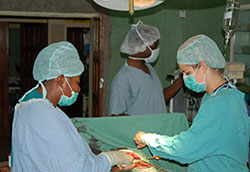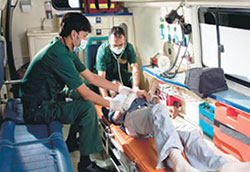 Photo courtesy of Dr. Krista Pfaendler
Photo courtesy of Dr. Krista Pfaendler
 Photo courtesy of Dr. Junaid Razzak,
Photo courtesy of Dr. Junaid Razzak,
Aga Khan University Fogarty’s
Center for Global Health Studies (CGHS) is leading
Advancing Emergency Care Research in LMICs to articulate barriers and solutions to conducting research in emergency or acute care settings in low- and middle-income countries (LMICs). Emergency or acute care is the common final endpoint for many health challenges in LMICs and therefore strengthening acute care is critical to improving public health in LMICs. However, research in the acute care context in LMICs remains difficult due to a variety of challenges related to data collection, data analysis, comparability of research findings and research ethics.
The goal of the project is to promote research that improves outcomes for patients and populations with acute life threatening or disabling conditions, focused on the care provided in the first minutes to hours of illness or injury. Care consists of diagnosis, resuscitation, symptom relief and health promotion activities and traditionally, delivered during transportation and in health care facilities with variable resources. Through identifying unique challenges, exploring lessons learned and articulating new strategies, methods and tools, we hope to facilitate more research and inform research designs specific to these settings.
Objectives
- Enhance collaborations in research conducted in acute care settings in LMICs by convening global, regional and national experts to exchange ideas and share lessons learned.
- Define challenges and propose solutions for conducting research in acute care settings in LMICs, including but not limited to (i) data definitions, collection, analysis, comparison and solutions including the use of technology and (ii) research ethics.
- Inform NIH and other research funding agencies and stimulate new investment in research conducted in acute care settings in LMICs.
Context
Approximately half of the total burden of diseases in LMICs is caused by time sensitive emergency or acute illnesses and injuries. According to the Disease Control Priorities Project (DCP2), as much as 45 percent of the disease burden in LMICs can be at least partially addressed by an effective and functional emergency care system. Five of the most frequent causes of death in LMICs - is chemic heart disease, stroke, lower respiratory infections, COPD and diarrheal diseases, primarily present as an emergency, have time sensitive treatments and show improved outcomes with quality acute care. The same is true for many causes of maternal and neonatal deaths, as well as injuries.
Strong emergency care systems based on robust evidence are critical to advancing global health. However, relatively low research investments and lack of expertise in emergency care research has resulted in considerable disparities between the burden of the emergency diseases and research output. Conducting research in the context of emergency care involves many unique challenges, but there are significant reasons to conduct research in these acute settings in LMICs.
Workshop
In July 2017, CGHS convened a group of researchers with expertise in emergency care in LMICs to explore pressing research priorities in emergency care in LMICs, as part of the Collaborative for Enhancing Emergency Care Research in LMICs (CLEER). The 39 expert participants were accepted from a pool of applicants and subsequently divided into four working groups focusing on ethics, surveillance and registries, health systems and clinical research. The participants represented 16 different countries and were mainly emergency medicine clinicians in both HICs and LMICs, joined by a few bioethicists and pediatricians.
The groups’ mandate was to identify important research gaps and critical research questions based on the level of the current evidence, and explore the methodological issues in answering some of these questions with a focus on population, design, outcomes, ethics and research environment and support structure. The supplement in
BMJ Global Health, "Advancing Emergency Care Research in LMICs," is the product of this collaboration and highlights how despite challenges, there are multiple compelling reasons and ways to conduct and invest in emergency care research and research capacity building in LMICs.
Project Lead
Dr. Junaid Razzak, Johns Hopkins University
Inquiries
Blythe Beecroft, M.S.
Global Health Research and Policy Analyst (Contractor)
Center for Global Health Studies
Fogarty Division of International Science Policy, Planning and Evaluation
Email:
blythe.beecroft@nih.gov
References
- Thind A, Hsia R, Mabweijano J, et al. Prehospital and Emergency Care. In: Debas HT, Donkor P, Gawande A, et al, eds.
Essential Surgery: Disease Control Priorities (Third Edition). Washington, DC: World Bank 2015.
- Reynolds TA, Sawe H, Rubiano AM, et al.
Strengthening Health Systems to Provide Emergency Care. In: Jamison DT, Nugent R, Gelband H, et al, eds. Disease Control Priorities: Improving Health and Reducing Poverty (Third Edition). Washington, DC: World Bank 2017:247-266.
- Razzak JA, Usmani MF, Bhutta ZA.
Global, regional and national burden of emergency medical diseases using specific emergency disease indicators: analysis of the 2015 Global Burden of Disease Study. BMJ Glob Health 2019;4(2):e000733
- Chang CY, Abujaber S, Reynolds TA, et al.
Burden of emergency conditions and emergency care usage: new estimates from 40 countries. Emerg Med J 2016;33:794-800